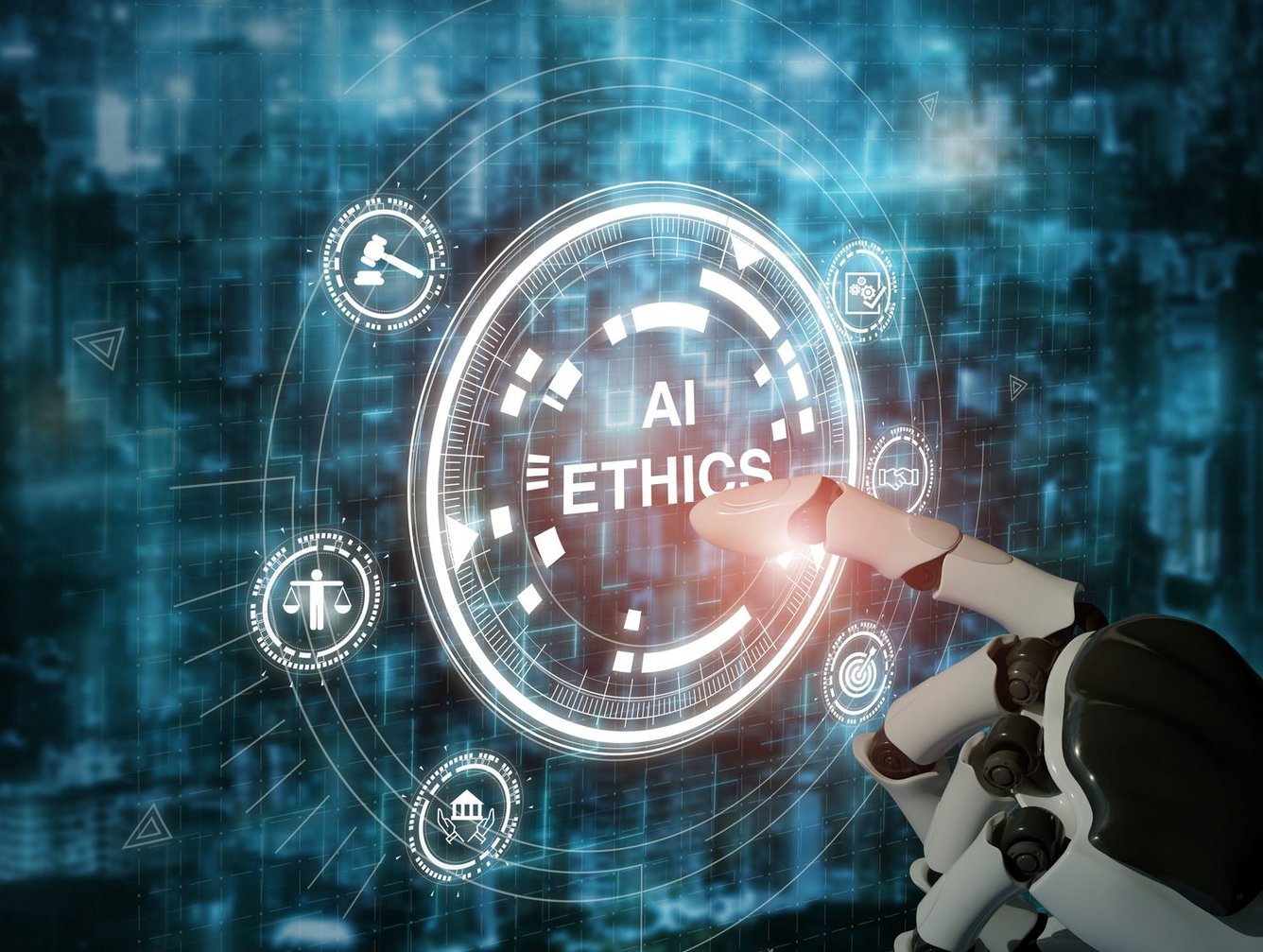
Top AI Companies Shaping Ethical AI, Human-AI Collaboration, and AI in Education
Estimated Reading Time: 15 minutes
Key Takeaways
- Top AI companies are prioritizing ethical frameworks to build trust and ensure societal benefits.
- Human-AI collaboration enhances capabilities without replacing human roles.
- AI is transforming educational systems through personalization and administrative automation.
- Ethical considerations are deeply intertwined with innovation and responsible AI development.
Table of Contents
- Understanding Ethical AI
- Human-AI Interactions
- AI in Education
- Top AI Companies
- The Intersection of Ethics, Human-AI Interaction, and Education
- Conclusion
- Additional Resources
- FAQ
Understanding Ethical AI
Ethical AI refers to the responsible development and deployment of AI systems that prioritize transparency, fairness, accountability, privacy, and societal benefit. As artificial intelligence increasingly powers critical decision-making systems, the world’s top AI companies are prioritizing ethical considerations to build trust and ensure their technologies benefit humanity.
Key Ethical Considerations
Transparency and Accountability
For AI to be trusted, users need to understand how decisions are made. Leading companies are developing explainable AI systems where the reasoning behind AI conclusions can be traced and understood by humans—moving away from “black box” systems toward transparent processes.
Bias and Fairness
AI systems trained on biased data can perpetuate or even amplify existing societal inequities. Ethical AI development includes rigorous testing to detect and mitigate algorithmic bias across dimensions like gender, race, and socioeconomic status.
Privacy and Data Security
Ethical AI practice demands strict data protection protocols. This includes securing personal information, obtaining informed consent for data usage, and complying with global privacy regulations like GDPR and CCPA. For more insights on AI regulation, refer to our discussion on The Future of AI Regulation.
Examples of Ethical AI in Practice
Several top AI companies have established comprehensive approaches to address these ethical concerns:
IBM has created robust frameworks for AI transparency and bias mitigation through its AI Ethics Board and open-source AI Fairness 360 toolkit. These initiatives help developers identify and address bias in machine learning models before deployment.
https://www.designveloper.com/guide/top-ethical-ai-companies/
Accenture established a Centre of Excellence specifically focused on generative AI ethics. The company has trained over 40,000 employees on responsible AI practices, ensuring ethical considerations are integrated throughout their development process.
https://www.designveloper.com/guide/top-ethical-ai-companies/
Nvidia implements regular ethical reviews of its AI systems and publishes clear guidelines for developers using their platforms. Their AI ethics team collaborates across departments to ensure compliance with ethical standards throughout product development.
https://www.designveloper.com/guide/top-ethical-ai-companies/
These initiatives highlight how ethical AI development isn’t merely a philosophical exercise but a practical business necessity that strengthens consumer trust and ensures sustainable innovation.
Human-AI Interactions
Human AI refers to the collaborative relationship between humans and artificial intelligence systems, where each enhances the capabilities of the other. Rather than viewing AI as a replacement for human workers, leading companies are developing technologies that complement human skills and extend our capabilities.
Forms of Human-AI Collaboration
AI Assistants and Chatbots
Intelligent virtual assistants like Siri, Alexa, and ChatGPT represent one of the most common forms of human-AI interaction. These systems are increasingly capable of understanding context, recognizing emotional cues, and adapting responses based on past interactions with specific users.
https://smythos.com/ai-agents/ai-tutorials/human-ai-collaboration-examples/
Collaborative Robots (Cobots)
In manufacturing and healthcare, cobots work alongside human workers to handle repetitive or physically demanding tasks while humans focus on aspects requiring creativity, judgment, and emotional intelligence. These robots are designed with safety features and intuitive interfaces to facilitate seamless collaboration.
https://www.cs.cornell.edu/content/symbiotic-human-ai-interaction-examples-and-discussion
Personalized User Experiences
AI-driven recommendation systems create tailored experiences across various platforms—from streaming services suggesting content to e-commerce sites recommending products. These systems learn from individual preferences to enhance user satisfaction and engagement.
Challenges in Human-AI Interaction
Building effective human-AI partnerships faces several obstacles. Trust remains a primary concern, with users often skeptical of AI recommendations or uncomfortable sharing data necessary for personalization. AI systems still struggle with interpreting nuanced human emotions and contextual cues, limiting their effectiveness in sensitive situations.
Leading companies address these challenges through empathetic design—creating interfaces that acknowledge uncertainty and explain reasoning behind recommendations. Regular feedback loops allow systems to learn from user corrections, gradually building more accurate and helpful AI assistants.
AI in Education
AI in education is revolutionizing how schools, universities, and online platforms deliver learning experiences. Educational technology enhanced by artificial intelligence is creating unprecedented opportunities for personalization while streamlining administrative tasks that previously consumed valuable teaching time.
Key Applications of AI in Education
Personalized Learning Platforms
AI-powered educational platforms analyze student performance patterns to deliver customized content that matches individual learning styles, paces, and knowledge gaps. These systems adapt in real-time, providing additional practice in challenging areas or advancing students through material they’ve mastered.
Intelligent Tutoring Systems
Virtual tutors provide immediate feedback on student work, explaining concepts from different angles when students struggle. Unlike traditional education where teacher attention must be divided among many students, AI tutors offer one-on-one support at scale.
Administrative Automation
AI streamlines administrative tasks like grading multiple-choice assessments, scheduling classes, managing enrollment, and identifying at-risk students who might need additional support. This automation frees educators to focus on high-value activities like providing direct student guidance and developing creative course content.
https://www.ed.gov/sites/ed/files/documents/ai-report/ai-report.pdf
Benefits of AI in Education
- Enhanced learning outcomes through content that adapts to individual needs rather than forcing all students through identical material at the same pace
- Increased accessibility for students with diverse learning needs, including those with disabilities or those studying in different languages
- Efficient resource management that helps schools maximize their impact despite limited budgets
Ethical Considerations in Educational AI
Despite these benefits, AI in education raises important concerns. Algorithmic bias could disadvantage certain student populations if training data isn’t sufficiently diverse. Student data privacy remains a paramount concern, particularly for K-12 students. Human oversight is essential to ensure AI systems support rather than replace the crucial human elements of education.
https://www.ed.gov/sites/ed/files/documents/ai-report/ai-report.pdf
Top AI Companies
The artificial intelligence landscape is dominated by several innovative companies driving adoption across industries. These top AI companies are pioneering advances in ethical frameworks, human-machine collaboration, and educational applications.
Nvidia
As the global leader in AI computing hardware, Nvidia’s GPUs power much of today’s AI revolution. The company’s dedicated AI ethics team conducts regular audits of their technologies and publishes transparency reports on potential biases and safeguards.
In human-AI collaboration, Nvidia’s Omniverse platform enables scientists and engineers to work alongside AI in shared virtual environments. Their Clara healthcare platform showcases how human medical expertise can be augmented by AI diagnostic capabilities.
https://www.fastcompany.com/91269023/artificial-intelligence-most-innovative-companies-2025
https://www.ig.com/en/news-and-trade-ideas/best-ai-stocks-to-watch-230622
OpenAI
Creator of ChatGPT and DALL-E, OpenAI has fundamentally changed how humans interact with AI systems. Their focus on AI safety includes extensive research into alignment techniques that ensure AI systems act according to human values and intentions.
OpenAI’s language models are widely used in educational applications, from interactive tutoring to content generation for educators. Their iterative approach to development involves extensive user feedback and safety testing.
https://www.fastcompany.com/91269023/artificial-intelligence-most-innovative-companies-2025
Google DeepMind
Known for breakthrough achievements like AlphaFold, which revolutionized protein structure prediction, Google DeepMind maintains strong ethical AI guidelines. Their fairness frameworks help detect and mitigate bias in machine learning models.
DeepMind has invested significantly in research on AI’s educational applications, particularly in developing systems that can adapt to different learning styles and needs. Their research papers on machine teaching have advanced the field of AI in education.
https://www.designveloper.com/guide/top-ethical-ai-companies/
https://www.fastcompany.com/91269023/artificial-intelligence-most-innovative-companies-2025
Anthropic
Founded with a focus on AI safety, Anthropic created Claude, a language model designed with constitutional AI principles that emphasize harmlessness and helpfulness. The company actively works to reduce bias in their models through innovative training techniques.
Claude’s ability to understand complex contexts makes it particularly valuable for educational applications where nuanced understanding of student questions is critical. Anthropic’s transparent approach to development builds trust with users and partners.
https://explodingtopics.com/blog/ai-startups
Microsoft
Microsoft has integrated AI across its product ecosystem, from Office applications to Azure cloud services. Their Responsible AI initiative includes clear principles and governance structures to ensure ethical development.
In education, Microsoft Teams and other learning tools incorporate AI to create personalized experiences for students while giving educators powerful analytics to understand classroom dynamics. Their partnerships with educational institutions ensure their tools address real classroom needs.
https://www.fastcompany.com/91269023/artificial-intelligence-most-innovative-companies-2025
AMD
As a provider of high-performance AI computing hardware, AMD focuses on sustainability in manufacturing while delivering the processing power needed for advanced AI applications. Their chips power many data centers running educational AI platforms.
AMD has created specific hardware optimizations for common AI educational workloads, helping make advanced educational technology accessible to schools with limited budgets.
https://www.crn.com/news/ai/2025/the-25-hottest-ai-companies-for-data-center-and-edge-the-2025-crn-ai-100
https://www.ig.com/en/news-and-trade-ideas/best-ai-stocks-to-watch-230622
Databricks
Specializing in unified analytics for AI and machine learning at scale, Databricks has embedded fairness tools and explainability features into their platforms. Their ethical approach emphasizes transparency in data processing.
Educational institutions use Databricks for real-time student analytics that help identify struggling students before they fall behind. The company’s commitment to data security makes them a trusted partner for handling sensitive student information.
https://explodingtopics.com/blog/ai-startups
Mistral AI
This emerging player focuses on creating efficient, smaller AI models that can run on edge devices with limited computing resources. Their open-source approach promotes transparency and allows community verification of their algorithms.
Mistral’s efficient models are particularly valuable for educational institutions with budget constraints, enabling AI-powered learning on existing hardware rather than requiring expensive upgrades.
https://www.fastcompany.com/91269023/artificial-intelligence-most-innovative-companies-2025
IBM
A pioneer in ethical AI development, IBM has created comprehensive frameworks for explainability and transparency. Their Watson AI platform incorporates strong governance controls and regular ethical reviews.
IBM has numerous collaborations with educational institutions, using their AI ethics expertise to ensure educational applications protect student privacy while delivering personalized learning experiences.
https://www.designveloper.com/guide/top-ethical-ai-companies/
The Intersection of Ethics, Human-AI Interaction, and Education at Leading AI Companies
The most innovative AI companies understand that ethical AI principles, effective human-machine collaboration, and educational applications are deeply interconnected. By examining how these aspects converge, we gain insight into the most promising paths forward for artificial intelligence.
Ethical Foundations for Trust
Top AI companies recognize that ethical practices create the foundation for effective human-AI partnerships. Without transparency about how AI systems function, users remain skeptical and hesitant to collaborate with AI tools. Companies like IBM and Microsoft publish detailed transparency reports and develop open-source communities where their algorithms undergo public scrutiny, building trust with users and stakeholders.
Users are more willing to embrace AI collaborations when they understand how systems reach conclusions and what safeguards exist against potential harms. This trust is particularly crucial in educational settings, where student well-being and fair treatment are paramount concerns.
User-Centered Design
Leading companies design AI systems with human collaboration as a central consideration rather than an afterthought. This human-centered approach manifests in interfaces that clearly communicate AI capabilities and limitations, recognize and respond appropriately to emotional contexts, and provide meaningful control over AI-driven processes.
For example, educational AI tools increasingly incorporate “teacher-in-the-loop” models where AI makes initial recommendations but educators maintain authority over important decisions. This approach combines AI’s analytical power with human judgment and empathy.
https://smythos.com/ai-agents/ai-tutorials/human-ai-collaboration-examples/
Educational Impact Through Ethical AI
Companies investing in educational AI applications demonstrate how ethical principles support better learning outcomes. Privacy-preserving analytics help identify struggling students without compromising sensitive data. Fairness audits ensure educational AI doesn’t disadvantage certain student populations.
Google, Microsoft, and IBM have established dedicated educational initiatives that apply their ethical AI frameworks to address challenges in learning environments. These collaborations between AI developers and educators create systems that respect student agency while expanding educational opportunities.
https://www.ed.gov/sites/ed/files/documents/ai-report/ai-report.pdf
Balancing Innovation with Responsibility
The intersection of these domains reveals how responsible AI development doesn’t hinder innovation—it enables sustainable advancement by building public trust and preventing harmful outcomes that could trigger regulatory backlash. Companies that integrate ethical considerations from the earliest stages of development create more robust, widely-adopted AI systems.
This balanced approach is particularly evident in educational applications, where the stakes of getting AI wrong are especially high. By prioritizing student safety, privacy, and equitable treatment, top AI companies create educational tools that genuinely enhance learning rather than simply automating existing practices.
Conclusion
Top AI companies are fundamentally reshaping our technological landscape through their commitments to ethical AI, human-AI collaboration, and educational innovation. As we’ve explored throughout this examination, these three dimensions are not separate considerations but interconnected aspects of responsible artificial intelligence development.
The leading organizations in this space—from established giants like Microsoft, Google, and IBM to innovative startups like Anthropic and Mistral AI—differentiate themselves not just through technical capabilities but through their approaches to building trustworthy, human-centered systems. Their ethical frameworks provide the foundation for effective collaboration between humans and AI, which in turn enables transformative educational applications.
As artificial intelligence continues to evolve, the companies profiled here will likely remain at the forefront by maintaining this balanced approach. Their leadership in addressing ethical and social considerations while pushing technical boundaries ensures that AI’s benefits can be widely shared across society.
The future of AI looks promising precisely because these top AI companies are demonstrating how ethical principles, human-centered design, and educational advancement can progress hand-in-hand. By continuing to prioritize responsible innovation, they are creating artificial intelligence that augments human capabilities rather than replacing them, respects human values rather than undermining them, and expands access to knowledge rather than concentrating it.
Additional Resources
For those interested in exploring these topics further, the following resources provide valuable insights:
Ethical AI Frameworks
- IBM’s AI Ethics Guidelines and Fairness 360 Toolkit
- Stanford Human-Centered AI Institute’s Policy Publications
- OECD AI Principles for Responsible Development
- https://www.ed.gov/sites/ed/files/documents/ai-report/ai-report.pdf
Human-AI Collaboration
- SmythOS guides on designing effective AI assistants
- Cornell University’s research on symbiotic human-AI interaction
- Case studies of successful collaborative robots in healthcare and manufacturing
AI in Education
- U.S. Department of Education reports on AI policy and implementation
- Research papers on adaptive learning systems and outcomes
- Ethical guidelines for AI use in K-12 and higher education
Company Resources
- Nvidia’s AI technical documentation and ethics statements
- Microsoft’s Responsible AI resources and educational partnerships
- Google DeepMind’s research papers on machine learning applications
- Anthropic’s constitutional AI principles and safety research
FAQ
What is Ethical AI?
Ethical AI involves the development and deployment of AI systems that prioritize transparency, fairness, accountability, privacy, and societal benefit to ensure they are trustworthy and beneficial to humanity.
How do top AI companies ensure fairness in their AI systems?
Top AI companies implement rigorous testing to detect and mitigate algorithmic biases, utilize fairness toolkits, and establish AI ethics boards to oversee the responsible development of their AI systems.
What role does AI play in modern education?
AI enhances education through personalized learning platforms, intelligent tutoring systems, and administrative automation, improving learning outcomes, accessibility, and resource management.
How do human-AI collaborations benefit industries?
Human-AI collaborations enhance capabilities by allowing AI to handle repetitive or data-intensive tasks while humans focus on creative, judgment-based, and emotional aspects, leading to more efficient and innovative outcomes.
Why is transparency important in AI systems?
Transparency builds trust by allowing users to understand how AI systems make decisions, ensuring accountability, and enabling the identification and mitigation of potential biases or errors.
















0 Comments